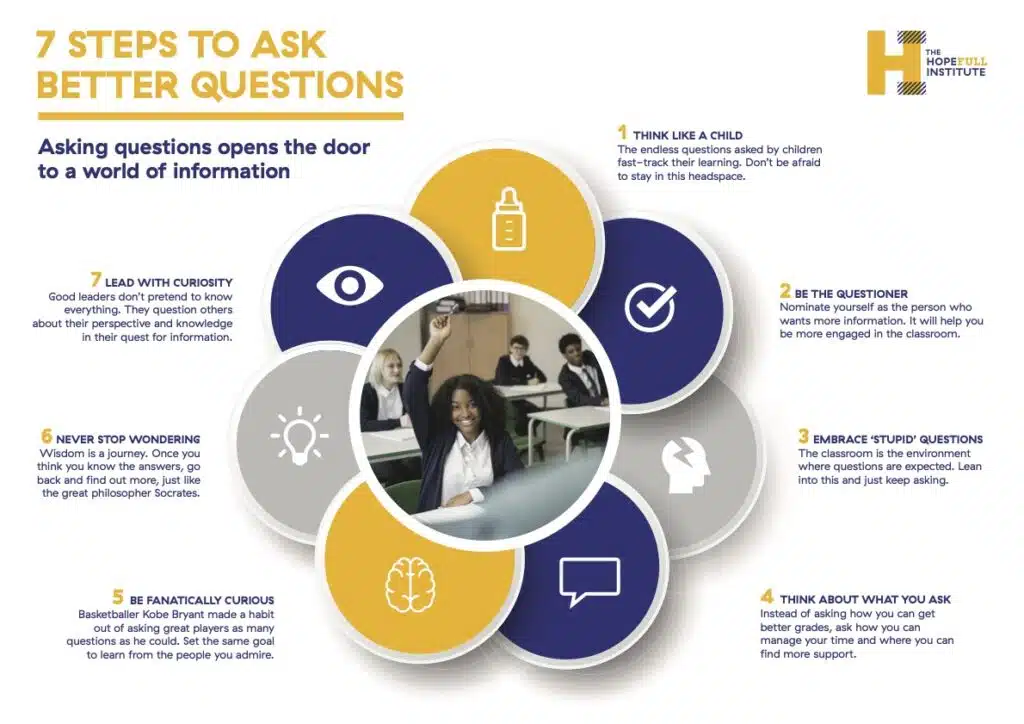“Computers are useless. They only give you answers.” – Picasso
With the rise of new artificial intelligence tools, one of the key attributes students need is the ability to ask good questions.
Dazzling questions lead to new innovations.
Warren Berger said, “Questions enable us to organise our thinking around what we don’t know.”
In a world of abundant knowledge, we need a specific and tailored question to get to the heart of our query without being overwhelmed with a deluge of information.
Crafting great questions, when engaging with AI and in class should become our default mode of operation. Just so we are clear, asking to go to the toilet does not qualify as a great question!
When you ask a question, ensure it is a well-thought-out one. Be a seeker of knowledge who is always inquisitive and always curious. Voltaire said, “Judge a man by his question rather than his answers”. If you don’t want to keep interrupting the class, write down your questions and raise these questions at an appropriate time.
Below are seven ways we can all learn to ask better questions and build up the confidence to find out what we don’t know.
1. Think like a child
Small children ask a lot of questions. Research says 4-year-old girls ask about 300 questions a day. The trajectory is then a steady decline till they hit Year 8, when the number of questions asked by students is almost zero.
Childhood is a time of accelerated learning. It is impossible to stop a baby from grabbing, touching, and gnawing on everything they can reach in an effort to understand the world they live in. Their curiosity and overeager inquisitiveness are a gateway to innovation, if they continue to be encouraged. But too often, adults are distracted by their own challenges and thus annoyed by this overeager curiosity – especially the persistent, “why?”
This child-like inquisitiveness is at the heart of the ability to ask great questions. Consider that if children ask a question and the answer is yes or no, they often follow it up with ‘why’. They also want to know how, what, where and when. And children listen for the response, so they can continue to form their beliefs about the world.
2. Be the questioner
“The uncreative mind can spot wrong answers, but it takes a very creative mind to spot wrong questions.” Antony Jay
A professor at university would randomly select one student in the lecture room to be the “questioner.” The questioner had to ask at least two questions during the session.
Over the years, the professor noticed that the questioner usually would gain and retain a better understanding of a subject – because the questioner had to be inquisitive – and more present than any other student in the room.
Asking questions keeps your brain engaged and active.
3. Start with a question, then think of a better one.
You may have heard the tale of two men who are walking in the forest. Suddenly, they come across an angry bear who starts to chase them. Both break into a sprint. While they’re running, one asks the other if he thinks they can outrun the bear and survive. The other says, “I don’t need to outrun the bear. The better question is: Can I outrun you?”
Questions should be useful; they should engage your mind in ways that lead to new insight solutions and action.
An ineffective question is one that might be obvious or vaguely formulated, one that doesn’t lead to action. A question such as, “How can I get better grades?” is too general to generate a response that would lead you down the path to better grades.
An effective question should provide clarity and focus:
“How can I manage my time better?”
“Where do I go for extra support?”
These are questions that get to the heart of the matter.
Sometimes, asking the right questions means questioning your own questions!
4. There are no dumb questions
“It’s not the answer that enlightens, but the question.” – Eugene Ionesco
When you enter a classroom, see it as a place of curiosity. You have an incredible opportunity to find out exactly what you need to know; it’s the sole purpose of you being there.
If you don’t feel like you’re getting the information you need; ask. In later life, there will be so many times when you are expected to know the answers. In the classroom, you’re expected to ask questions. Embrace it, and ask without fear.
The great mystic poet Heraclitus said, “We never step in the same river twice.” The idea is that when we return to a classroom, the class might be the same, and yet, we are different.
The context in which we are entering the class is different. What we are looking for is different. When they say we never step in the same river twice, they mean ‘it’s not the same river and we are not the same person.’
Yes, in many cases the classroom is exactly the same, but we are different, we have changed, and so every time I go back and enter a classroom, I find something in the information that is presented I have never seen before. Start with where you are, and in the next class search for a deeper question. If you do that consistently, in three weeks your questions will open a whole world of information.
5. Be fanatically curious
All top performers in any field are exceptional at asking great questions. What they ask and how they ask is a skill. A great questioner will suspend judgement just long enough to understand someone else’s perspective and verify if their truth is the truth.
Kobe Bryant asked a lot of questions. At Kobe’s celebration of life, Michael Jordan spoke of Kobe’s relentless questioning. At first, Jordan considered his curiosity a nuisance but it quickly turned into something he loved. Kobe would call or text him at eleven thirty at night or three in the morning with questions about post moves, footwork, or the triangle. His curiosity seemed endless, as was his pursuit to become the best basketball player that he could be.
Kobe himself said, “I asked a lot of questions. When playing with Bryan Scott, I asked him a lot of questions. Eddie Jones was great at chasing guards off the screens and I didn’t know how to do that. I would sit with him before practice after practice. With Magic and all the Laker greats, I would always sit them down and ask questions about certain games that I studied growing up. ‘What actually happened there, what did you feel there? and Why?”
The person who asks better questions, gets better answers.
6. Be like Socrates
Questions are the new answers. – Silicon Valley Motto
The great Greek philosopher and teacher Socrates would stimulate critical thinking by asking his students or fellow Athenians question after question.
Many times, his questions would bring illumination. At other times, they brought ridicule. His form of questioning would later become known as the Socratic method. Socrates’ goal was to ask questions, which challenge assumptions thereby bringing enlightenment to the questioner and the answerer. He believed that all wisdom begins with wondering.
Socrates’ reputation as a philosopher, thinker and pursuer of truth was well known. One day a man went to the Oracle of Delphi and asked who the wisest man in Greece was. The oracle responded by saying, ‘Socrates’. When the man came and told Socrates, he was bewildered. He then asked a series of questions, trying to prove the Oracle wrong.
“Wouldn’t you have to be wiser than me to know how wise I am?”
“How can I be the wisest when there is so much, I don’t know?”
“If somebody knows something I don’t know doesn’t that make them wiser?”
With question after question, he tried to uncover the error of this statement and set about trying to find someone who was wiser. He questioned everyone he could find and to his dismay everyone seemed to pretend to know things they clearly did not. Finally, he realised the oracle was right. He was the wisest man in Greece because he was willing to admit his own ignorance and how much he had to learn.
We need to lose the fear of looking unintelligent. Some of the smartest people in the world will repeat the same question 10 times a day, “I don’t understand, please explain that.” Give yourself permission to be that person.
7. Think like a leader and ask more questions
Many people often assume leaders should have all the answers. They think that to be a leader you must pronounce bold solutions to everyone’s problems that build people’s confidence and competence.
But that kind of approach in leadership erodes trust, especially at a time when change and uncertainty are the norm. If you think you have the answers to all important questions, you are either naïve — you have no idea how rapidly the world is changing — or you are being deceptive. In either case, you won’t find that people trust you for very long.
Sometimes, asking unreasonable questions will force you to think laterally. For instance, asking, “How can I improve my grades by 20% whilst only studying for 20 mins more?” Will force you to think outside of your current framework and thinking outside your current structure might be where the answers lie.
“Rarely do we find people who willingly engage in hard, solid thinking. There is an almost universal quest for easy answers and half-baked solutions. Nothing pains some people more than having to think.” – Martin Luther King, Jr.


